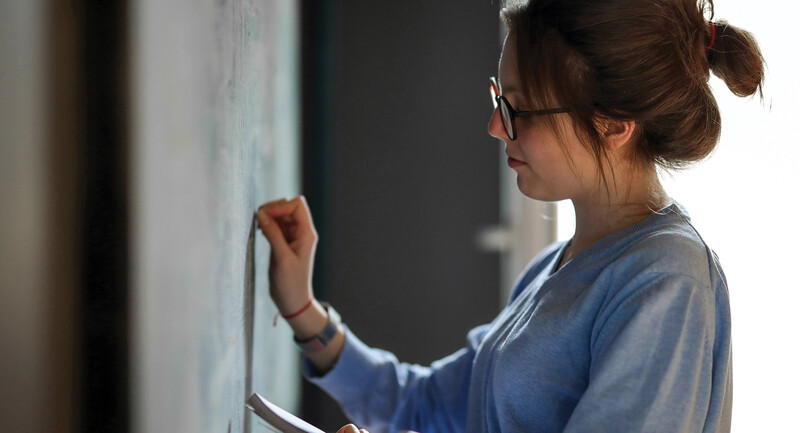Around this time last year, I embarked on an ambitious reflection process. I bought a large sketchbook and a new set of artist-grade pens, borrowed a mini photo printer from a friend, and set out to reflect on an extremely difficult year. I went month by month, printing out photos that helped me recall important moments, and answered the following questions:
- What happened?
- What did I feel?
- What did I learn?
- How did I live my word for the year? (My 2020 word was BEHOLD.)
- What else do I want to acknowledge or remember?
- What's the story I want to tell about this month?
We know from research that we build resilience when we go through rough times and emerge stronger than before—yet sometimes we don't recognize that growth unless we stop, look back, feel the emotions that arise, and process them.
As I answered these questions about 2020, it was cathartic to name the pain and difficulties I experienced. Some moments were hard to relive, but in doing so, I acknowledged the emotions that I hadn't had the fortitude to be with during that difficult time, and then I released them. I also recalled many "bright spots" that I hadn't noticed amid the challenges—sweet moments with my family and cats, time spent in nature, and homecooked meals. I was surprised, too, by how much learning I felt I'd done: I realized that "I need to ask for support" and "Sometimes the most important thing is to put one foot in front of the other." Resilience is boosted when we take away lessons from a hard period, and I learned a whole lot in 2020.
The final question—What's the story I want to tell about this year?—was the most useful. The story we tell ourselves about any event or time period will have a profound impact on our resilience. Things happen all the time, but the meaning we make of them shapes how we see the future, how we think about our agency, and how we approach the world. A story doesn't have to negate pain; there's no need to be a Pollyanna. But it must be expansive in order to contribute to your resilience. For example, a teacher could tell this story about last school year:
2020–21 was a waste. My eyeballs hurt from looking at Zoom so much. Kids didn't learn anything. I wanted to quit for most of it.
That's an example of a narrow, limited story that doesn't leave the teacher, the story creator, having named any learning or growth. That story won't increase resilience (it might even decrease it). In contrast, here's a broader story with more possibility that could boost resilience:
2020–21 was a hard year, and I missed being in-person with kids. But I learned a lot about what I need in order to feel successful as a teacher.
A Narrative of Resilience
Very often, we craft stories that we're not even conscious of, but that affect how we feel. For example, imagine you're walking down the hallway at school, and you pass a teacher who doesn't make eye contact or respond to your "Good morning!" What's the story you'd tell yourself about that incident? You could think, What's wrong with her? What did I do? which would leave you feeling confused or irritated. Or you could craft a different story: I wonder if something is going on with her. That's strange. That story might leave you feeling concerned or empathetic.
The story we tell about anything that happens will boost or drain our resilience—be it a year of pandemic teaching and racial reckoning, or an incident with a student at school. At the end of each calendar year, we have an opportunity to craft a narrative about the year we're closing out. This must come before setting goals, resolutions, or intentions for the coming year. Through the reflection process, we'll understand ourselves better and take those learnings into our hopes for the new year.
The story we tell ourselves about any event or time period will have a profound impact on our resilience.
Elena Aguilar
As 2021 ends and 2022 begins, I encourage you to slow down and take time to reflect on what you've done and been through. This past year was no piece of cake, but there are lessons to glean from it. Once you've closed up 2021, look ahead to 2022. Do you have goals, intentions, or resolutions to set? Do you want to pick a word for the year, a word that encapsulates your hopes or commitments? What would it look like for you to live that word?
My favorite activity for thinking ahead to the next year is this: Imagine it's the final day of that year (in this case: December 31, 2022) and write yourself a letter, as if you were writing on that day about the year that's ending. What do you want to say about 2022 when it comes to a close? That "This year was the one in which I finally started that grad school program I've always wanted to do. I also developed a new network of colleagues that I can lean on for all things professional. …" Be honest with yourself about your needs and wants.
Sharing the Process
I'm offering you this process for a couple of reasons: As a leader, you've got to attend to your own well-being and resilience so that you can take care of others. This process I've described to reflect on the year is one way to do so—a way that can help you transfer knowledge from one year to the next one. But I'm also offering this process because it's an exercise that you can share with the educators you support. You could devote a team meeting or PD session to reflection (and of course, you could do this at the end of the school year as well). Giving people a chance to reflect is a way to invite them to build their resilience. Take care of yourself and extend opportunities for others to take care of themselves. And may we craft empowering stories in 2022!









